Zhoug Sauce (Spicy Cilantro Skhug)
Green zhoug is a vibrant Middle Eastern hot sauce with cilantro, green chillies, garlic, spices and olive oil. The spicy cilantro sauce is delicious with sandwiches, shawarma, falafel, grilled meats and roasted vegetables.
This popular Middle Eastern condiment goes by many names. But whether you call it zhoug, zhug or skhug, it’s the same spicy cilantro sauce. And it’s utterly delicious.
Use the versatile hot sauce in Middle Eastern sandwiches like falafel pitas and shawarmas. Or serve it alongside grilled meats or roasted vegetables. You can even turn it into a spicy salad dressing.
I first came across zhoug in Jerusalem by Yotam Ottolenghi and Sami Tamimi. And now, no mezze spread is complete without a bowl of zhoug on the table! I adapted this recipe from their authentic zhoug recipe.
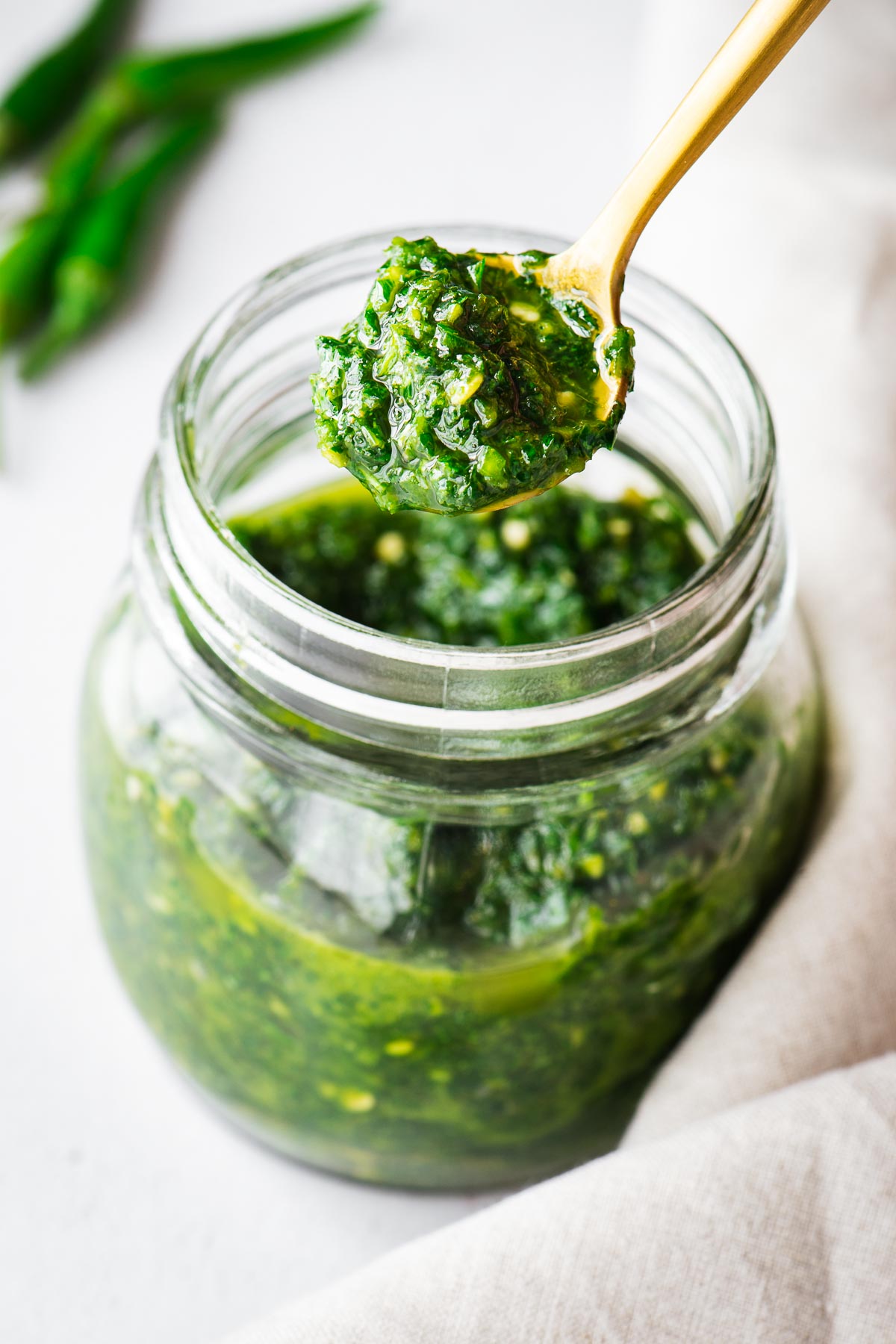
What is zhoug?
Green zhoug (pronounced zoog) is also known as zhug, skhug, sahawiq, bisbas or ma’booj. It is a spicy Middle Eastern condiment of cilantro (fresh coriander leaves), green chillies, garlic, olive oil and spices – like cumin, cardamom, caraway, cloves or black pepper.
Even though zhoug originates from Yemen – where it is known as sahawiq – it is hugely popular in Israel. In fact, according to Belazu, green zhoug is the most popular hot sauce in Israel. They often enjoy it with street food like falafel and shawarma.
Varieties of zhoug include red zhug (with red peppers) and brown zhug (with tomatoes). In Yemen, they even add dried sardines (called sahawiq wazif).
Yemenites use stones to grind the ingredients for traditional sahawiq. But you can use a mortar and pestle if you want a similar texture for your spicy cilantro paste at home. A food processor works well for large batches, as in the zhoug recipe card.
Zhoug sauce is also naturally gluten-free and vegan.
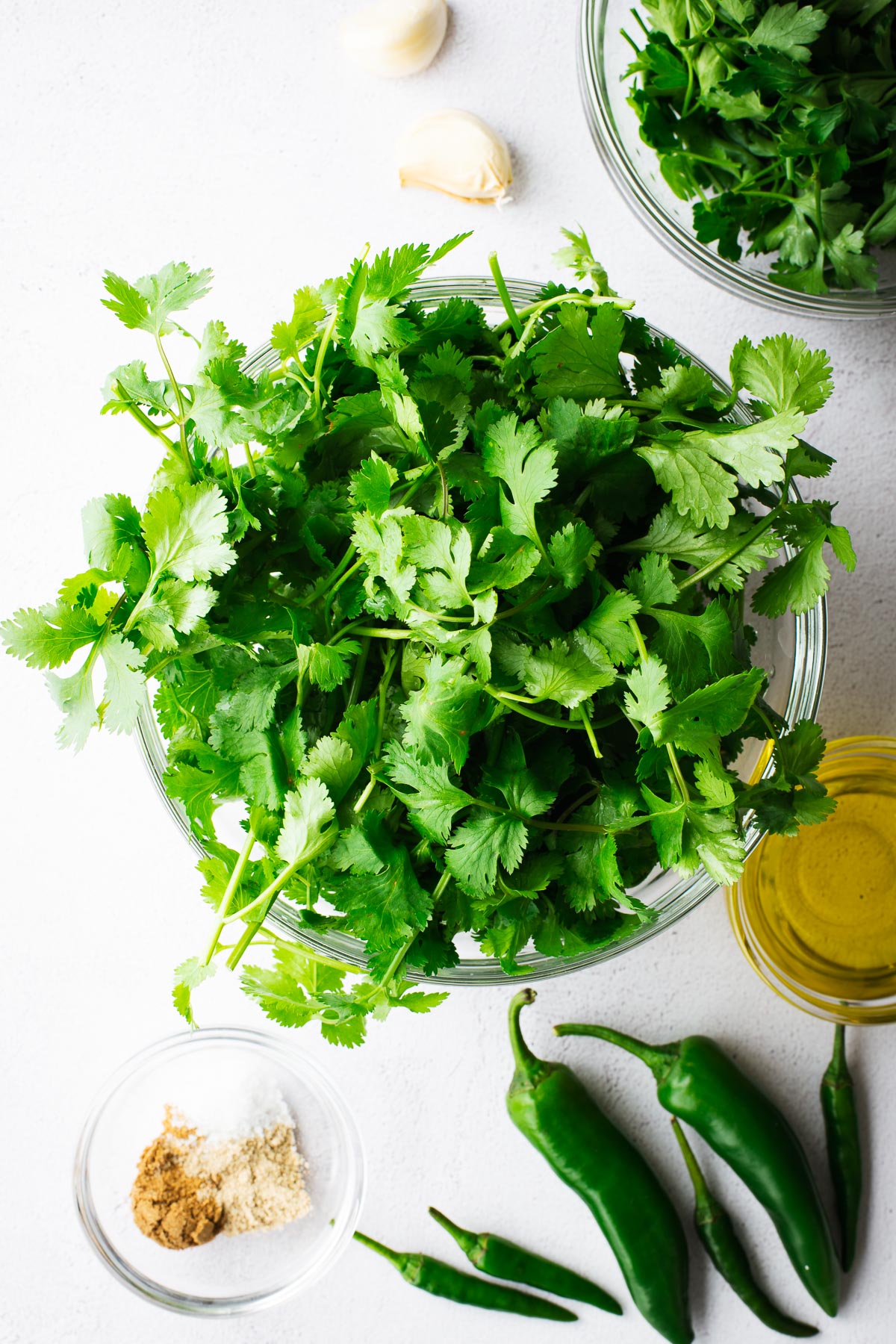
Ingredients & substitutes
I like my zhoug hot. But you can play around with the heat and spices to blend them to your own perfection.
- Fresh cilantro: Use the leaves and soft stems, roughly chopped. Zhoug is a spicy cilantro sauce, so substituting other green herbs for the cilantro may deliver a spicy green sauce. But it won’t be zhoug anymore. If you want a Middle Eastern hot sauce without coriander, make green tahini sauce (with only fresh parsley) or shatta sauce (no herbs) instead.
- Flat-leaf parsley: Use the leaves and soft stems of the fresh parsley, roughly chopped. You can also use the curly parsley variety or swap the parsley for more fresh cilantro leaves.
- Hot green chillies: To ensure a vibrant green zhoug, stick to green chillies. Zhoug is supposed to be hot, so I use four hot green chillies. But if that sounds too spicy, try jalapeño peppers – remove the jalapeño seeds and membrane for the mildest version. You can also use a teaspoon of hot green shatta (coarse fermented green chilli sauce) instead of chillies.
- Fresh Garlic: Peel two fat cloves of garlic and roughly crush them. I never use shop-bought minced garlic, but go ahead and substitute a teaspoon of that if it is what you have. Or add a teaspoon of garlic powder if you’re not into raw garlic.
- Spices: I prefer ground cumin and ground cardamom. But you can also add ground coriander. Or try whole spices like cloves, cardamom seeds, cumin seeds or caraway.
- Salt: I use ground sea salt, but you can also use kosher salt. Taste the spicy sauce after blending and adjust the seasoning according to taste.
- Olive oil: Extra virgin olive oil gives the spicy condiment its luscious texture. Use the best quality, best-tasting olive oil you have. You will taste the difference.
- Water: Add water (or more olive oil) until you have a coarse paste-like sauce.
Related posts:
Optional add-ins
Some zhoug recipes call for fresh lemon juice – and you can certainly add a tablespoon of lemon juice if you want a bit of acidity. But I adore the uncomplicated cilantro flavour of green zhoug. Instead, I serve it alongside other acidic Middle Eastern condiments, like sumac onions or lemon tahini sauce.
You can also add a teaspoon of red pepper flakes to add another spicy dimension. But this will make your zhoug less vibrantly green.
How to make zhoug in a food processor
Place the roughly chopped herbs, chillies and garlic cloves in a food processor.
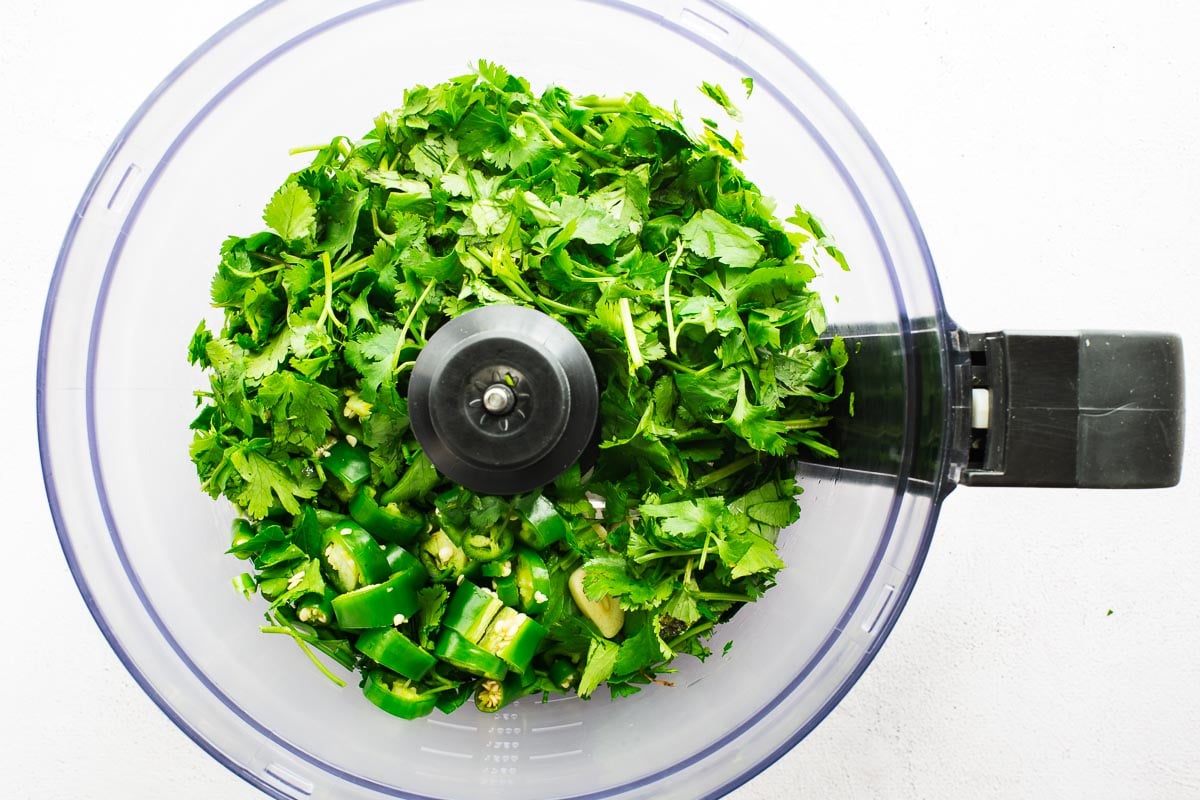
Blitz the chopped herbs, chillies and garlic cloves in the food processor for 30 seconds – or until finely chopped.
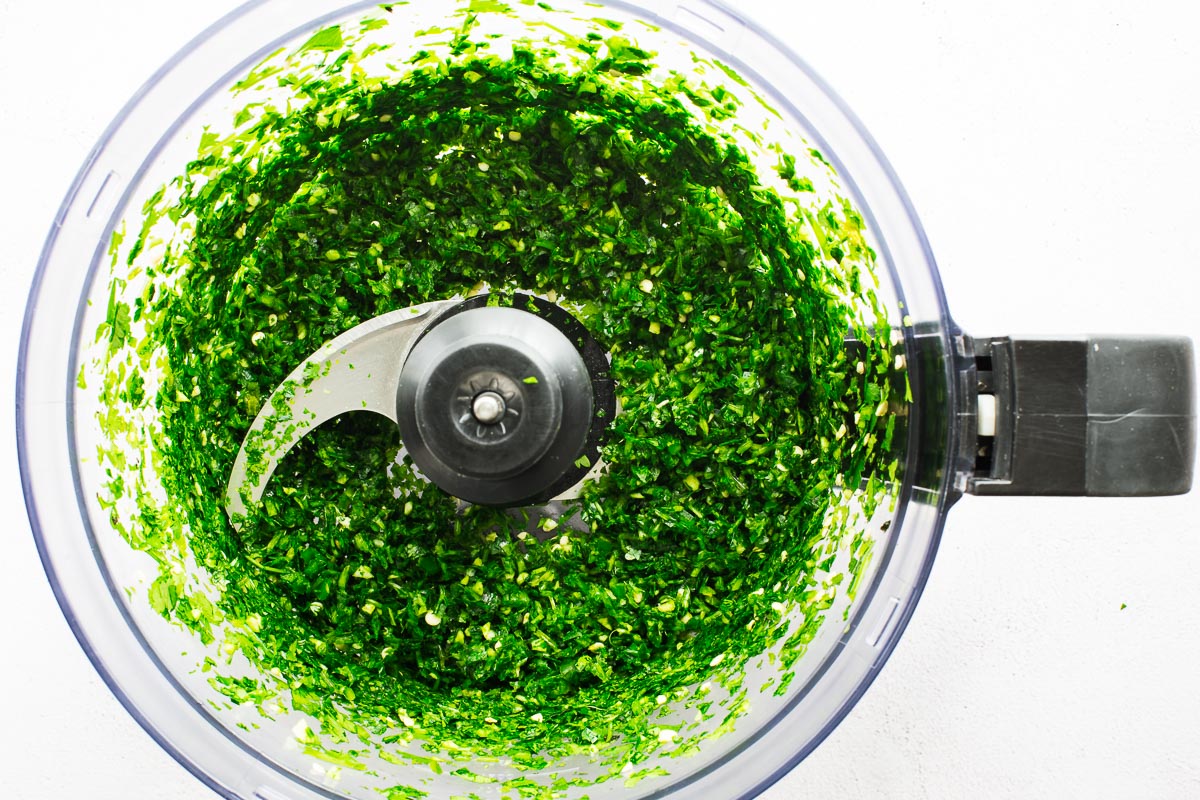
Add the ground spices, salt, six tablespoons olive oil and four tablespoons water.
Pulse in the food processor until the ingredients are well combined, but the spicy sauce still has a coarse texture. It should take about 30 seconds.
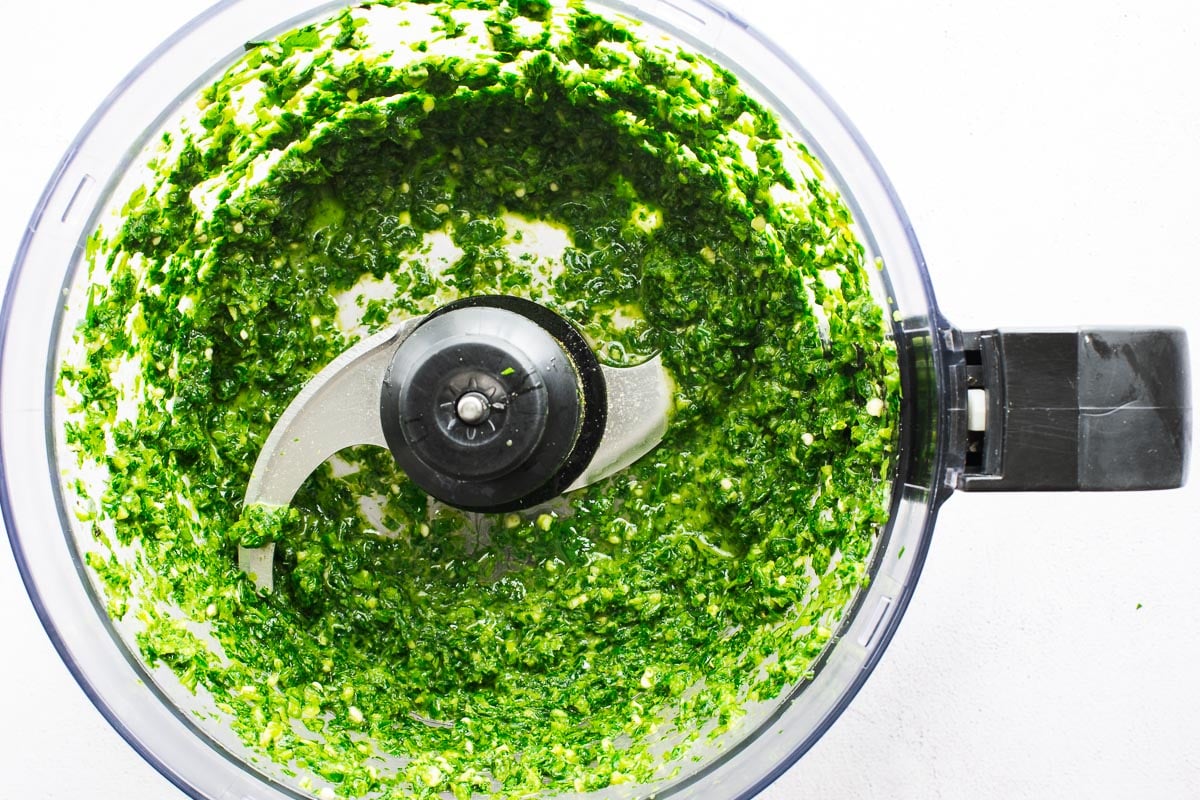
Resist the temptation to over-process the sauce. The paste should have a coarse texture. Taste and add more olive oil and salt to your liking.
How to make zhoug with a mortar & pestle
A food processor makes light work of a large batch of zhoug – like in the recipe card below. While having extra zhoug is never a problem in our house, a mortar and pestle is super handy for a small batch of zhoug.
Sahawiq (another name for zhoug) stems from the Arabic root “to pestle or to crush”. So a mortar and pestle is the perfect tool for the job!
To make a smaller batch of zhoug, scale down the ingredients outlined in the zhoug recipe to fit in your mortar (bowl).
Add the roughly chopped garlic and coarse salt to the mortar – coarse salt helps to mash the garlic into a paste. Use your pestle to bash and grind the garlic into a paste.
Next, add the herbs and chillies. Continue to grind until you have a vibrant green paste.
Stir through the spices, water and olive oil.
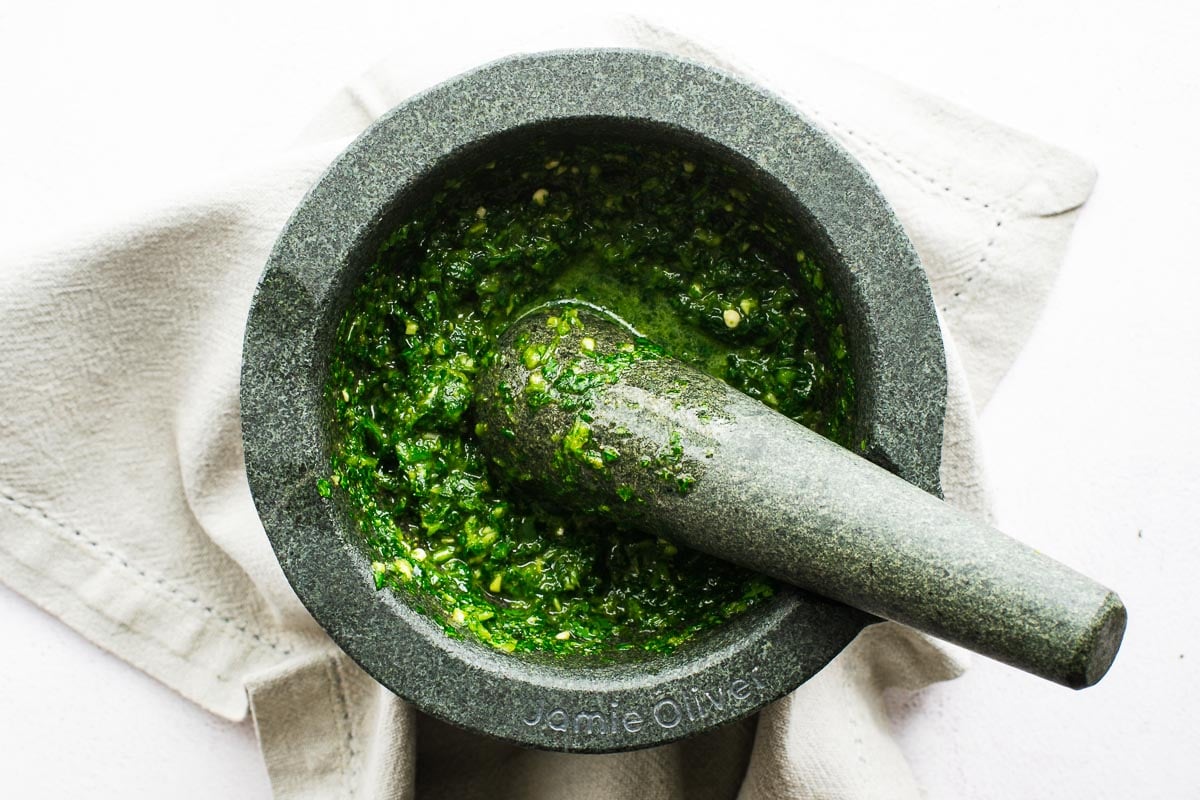
How to store zhoug sauce
Transfer the sauce to a sterilised jar, then seal and refrigerate. Use the sauce within three weeks.
Or freeze the sauce for up to three months. Use an ice cube tray for small portions of zhoug. Add more olive oil to loosen the spicy zhoug paste after defrosting.
Serving suggestions
Spoon this versatile sauce over anything that requires a spicy kick:
- Drizzle it over scrambled eggs.
- Mix two tablespoons of zhoug, two tablespoons of fresh lemon juice and four tablespoons of olive oil for a spicy salad dressing.
- Spoon generous dollops into soup (like this harissa red lentil soup).
- Stick to tradition and serve it with warm pita bread and crispy Middle Eastern falafel or easy, baked falafel made from canned chickpeas.
- You can also top hummus with a few spoons of zhoug (try this lemony hummus recipe).
- Mix it with tahini for a quick and easy green tahini sauce.
- Or stir it through yoghurt for a rippled green yoghurt sauce.
The uses for zhoug are endless. But it’s Jerusalem‘s grated tomatoes that stole my heart. Ottolenghi and Tamimi suggest you dunk a slice of white bread in grated tomatoes, then in zhoug and “you’ll be in heaven”. Zhoug heaven indeed.
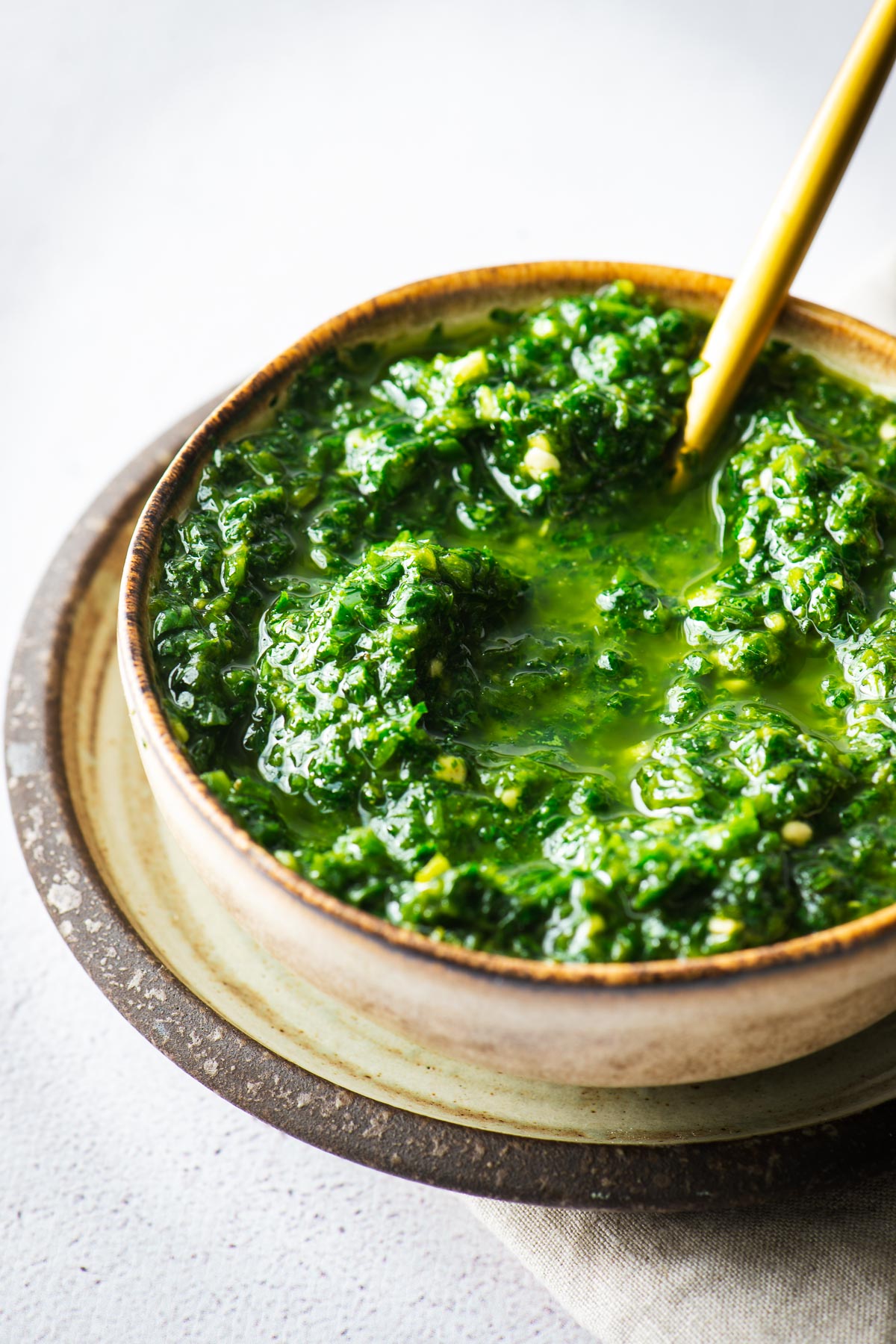
Frequently Asked Questions
Skug (skhug, zhoug, or zhug) is a spicy Middle Eastern condiment of cilantro, green chillies, garlic and spices blended with olive oil. It has a coarse paste-like texture.
If you don’t have the ingredients (or dislike cilantro), you can mix shatta sauce (or another green hot sauce) with fresh, chopped green herbs (like parsley or mint leaves) and olive oil. Taste and adjust the seasoning.
You can safely freeze zhoug for up to three months, though the vibrant green colour may dull a bit. Defrost the frozen zhoug completely, then stir through more extra virgin olive oil to loosen the zhoug paste.
Add zhoug to sandwiches, shawarma or falafel. It is also great with grilled meats and roasted vegetables. Or serve zhoug with white bread and grated tomato for a delicious snack.
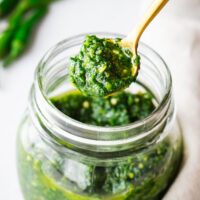
Equipment
- Food processor – or a mortar and pestle for small batches
Ingredients
- 2 cups cilantro, leaves and soft stems, roughly chopped
- ½ cup flat-leaf parsley, leaves and soft stems, roughly chopped
- 4 hot green chillies
- 2 garlic cloves, peeled and roughly chopped
- 1 teaspoon ground cumin
- ½ teaspoon ground cardamom
- 1 teaspoon salt
- 6 tablespoons olive oil, plus more as needed
- 4 tablespoons water
Instructions
- Place the roughly chopped herbs, chillies and garlic cloves in a food processor and blitz for 30 seconds (or until finely chopped).
- Add the ground spices, salt, six tablespoons olive oil and four tablespoons water. Pulse in the food processor until well combined (about another 30 seconds). Scrape the sides down if needed.
- Zhoug has a coarse paste-like texture, so resist the temptation to over-process the sauce. Taste and add more olive oil and salt to your liking.
- Use straight away. Or transfer the sauce to a sterilised jar, then seal and refrigerate. Use the sauce within three weeks.
Notes
- I use four very hot green finger chillies. When I use something milder, like Serenade chillies or jalapeños, I increase the quantity to six chillies. For more information, see the ingredients section.
- A food processor works best to maintain the coarse texture of the zhoug paste. Take care not to over-process the ingredients if you use a blender.
- You can make smaller batches by hand with a mortar and pestle. For instructions, see how to make zhoug with a mortar and pestle.
More Middle Eastern sauces
If you like this lemon tahini sauce, you might also like these tahini dressings and sauces



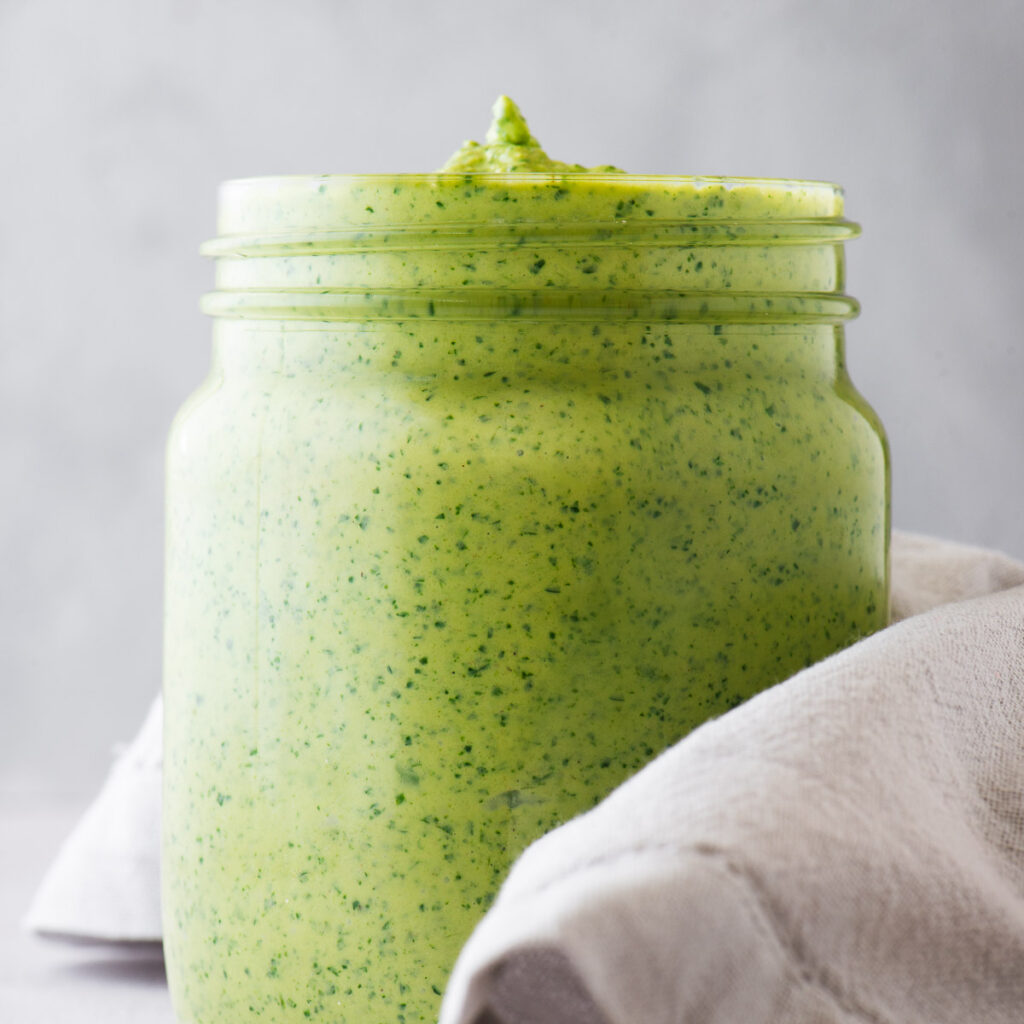
This. Sauce. Is. Amazing! Flavor-packed and easy to make, this is a staple on our table. Thank you!
I’m so happy you love this zhoug sauce recipe as much as I do, Angela! I can never have enough zhoug! 😂
Absolutely delicious and quick to make too! Served alongside shawarma, not a drop left! Thank you!
Fantastic! I’m so glad you loved my zhoug sauce recipe! Serving it with shawarma is just perfect, I could definitely eat some right now!
BEST Zhoug Sauce recipe I’ve tried, hands down!!! The other recipes I’ve tried just seemed off, so I kept searching, this one is just like the perfect balance of everything, and I am so happy that I found it!!! Thank you!!
Jackie, your comment just made my day! I am so happy you loved it as much as I do!
This sauce was so good! I can tell now that this is going to be part of my regular repertoire now, thank you so much for sharing :)
Thank you, Cathleen, I’m so happy you love the recipe. I can really add zhoug to any meal!